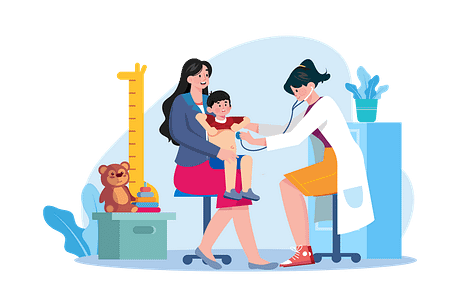
What to Expect During Your Baby’s Eighth Well-Child Visit ( 18 Months Old)
At 18 months, your child is developing rapidly, both physically and mentally. During this visit, your pediatrician will assess your child’s growth, behavior, and development to ensure everything is on track. Below are the key areas covered during this visit:

39 Key Points to Expect During the Eighth Well-Child Visit
- Identify New Risk Factors: The doctor will ask if there are any new risk factors for your baby or family, such as changes in your living situation or health concerns.
- Diet and Feeding: Be ready to discuss your child’s diet, including the quantity and quality of their food intake. The doctor might observe a feeding session if there are concerns about food fussiness. Food safety practices at home may also be discussed.
- Screen Time: The doctor will ask how much screen time your child is getting and provide recommendations to keep it within healthy limits.
- Sleep Hygiene: You’ll be asked about your child’s sleep patterns and any challenges with sleep.
- Childproofing at Home: The doctor will check if your home is childproofed, including the safety of furniture, play areas, and toys. They will also talk about safeguarding outdoor play.
- Growth Measurements: Your child’s weight, length, and head circumference will be measured and plotted on a growth chart.
- MCP Card Review: If your child’s MCP card is incomplete, the doctor will help fill it out and interpret the data.
- Vision and Hearing Concerns: Be prepared to answer if you’ve noticed any concerns about your child’s vision or hearing.
- Daily Tasks Involvement: The doctor will ask whether your child is participating in daily tasks like feeding themselves, helping with dressing, bathing, and grooming.
- Parent-Child Bonding: The doctor will observe how you and your child interact, paying attention to how you respond to your child’s cues and needs.
- Separation Anxiety: The doctor will observe how your child reacts when you leave and return, which helps assess attachment.
- Play and Interaction: They will watch how you play with your child. If you haven’t initiated play, the doctor may suggest some activities to try during the visit.
- Previous Visit Review: The doctor will go over the notes from your last visit and check if any instructions were followed.
- Health Concerns: You’ll be asked if you have any new health concerns about your baby.
- Behavioral Concerns: If you have any concerns about your child’s behavior, the doctor will offer advice on how to address them.
- Responding to Unacceptable Behavior: You may be asked how you handle unacceptable behavior in your child and be given tips on how to respond effectively.
- Playing and Talking with Your Baby: The doctor will ask how you and your partner play with and talk to your baby.
- Getting Your Baby to Smile: You might be asked how you engage your baby to make them smile and laugh.
- IAP-PSQ-4 Questionnaire: Towards the end of the consult, the doctor may ask you to fill out this questionnaire, which assesses parenting stress.
- Growth Chart Interpretation: The doctor will review the growth chart with you and explain your child’s growth trends.
- General Physical Exam: The doctor will examine your child for common issues like anemia, rickets, and teeth eruption.
- Systemic Examination: A more detailed physical examination will be conducted to assess your child’s overall health.
- Neurodevelopmental Assessment: If there are any concerns from the MCP card, the doctor will perform a neurodevelopmental assessment.
- Vision Check: If it has been a year since the last vision screening, the doctor will check for issues like squint or red reflex problems.
- Hearing Check: The doctor will assess your child’s hearing by seeing how they respond to different sound levels and distances.
- Signs of Abuse or Neglect: The doctor will check for any red flags that might indicate neglect or physical, emotional, or sexual abuse.
- Immunizations: Your child will receive the necessary immunizations for this age.
- Encouraging Self-Feeding: The doctor will advise continuing breastfeeding and offering finger foods for your child to eat independently under supervision.
- Allowing Messiness: Let your child be messy during meals. It’s an important part of their development.
- Avoiding Junk Food: You’ll get advice on avoiding junk food, sweetened beverages, and how to keep feeding consistent even when your child is sick.
- Recognizing Cues: The doctor will guide you on recognizing your child’s verbal and non-verbal cues and how to respond appropriately.
- Helping with Self-Regulation: You’ll learn how to help your child manage their behavior using proper tone, body language, and facial expressions.
- Encouraging Play: The doctor will suggest activities like climbing stairs, playing with push-pull toys, balls, and outdoor play to promote large muscle development. They’ll also recommend creative activities like scribbling, finger painting, and pretend play.
- Improving Communication: You’ll be encouraged to point out objects, share storybooks, and teach simple songs or rhymes. Start naming smaller body parts and private parts during bath time for safety.
- Reading Together: Reading nursery rhymes and storybooks with your child is a great way to build language skills. Encourage pointing at pictures as you read.
- Involving in Daily Tasks: You can involve your child in simple household tasks to foster independence and responsibility.
- Personal Hygiene: The doctor will discuss how to start teaching your child about personal hygiene, including skin and teeth care.
- Accident Prevention: Your doctor will talk about preventing falls, burns, choking, and other potential accidents. They’ll offer tips on how to keep your home safe.
- Danger Signs and Medical Attention: Lastly, your doctor will talk about signs that may require seeking medical attention and remind you about the next immunization.
This visit emphasizes promoting independence, developmental stimulation, and safety, helping your toddler grow into their next phase of development.










































